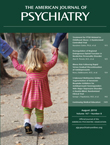Some studies, while they inform us, nonetheless raise more questions than they answer. In this issue, Baldessarini et al. present provocative information for both clinicians and researchers in their article "Illness Risk Following Rapid Versus Gradual Discontinuation of Antidepressants" (
1). The study is not a controlled trial of an intervention, but rather, like much informative clinical research, it is essentially a detailed observation of patients. Patients with mood and anxiety disorders were carefully followed at clinics in Sardinia while they were treated with antidepressants. The study extended from the era of the tricyclic antidepressants to the modern era of selective serotonin reuptake inhibitors. Abrupt discontinuation of medication, usually initiated by patients themselves, was more likely to result in the return of depression within several months, compared to tapering the dosage over several weeks, generally recommended by physicians, which resulted in less likelihood of relapse. All patients included in the study had close to normal mood at the time of medication discontinuation, regardless of who made the decision to stop treatment. Patients whose antidepressants were stopped because of emerging mania were not included in the study. Even when a tapering regimen was used, medications with short half-lives, like paroxetine and venlafaxine, were more likely to produce early relapse than the longer-acting medications, including the tricyclics.
As with any observational study, there are uncertainties. It is possible that the patients who decide to stop medications abruptly have particular characteristics of biology, manifest as cyclothymia and rapid relapse, or histories of trauma or personality disorders or socioeconomic disadvantages that make them more vulnerable to relapse into depression. Although baseline characteristics seem similar between the groups of patients in the study, these factors were not specifically checked. Similarly, the apparent advantage of the tricyclics confounds the differences in drug class with differences both in the decades in which the patients were treated and in the longer half-lives of tricyclics compared to the widely used modern drugs with short half-lives (specifically paroxetine and venlafaxine). There may be factors unique to the setting of the study in Sardinia. For example, Sardinians show signs of relative genetic isolation from other populations (
2). Thus, genetic heterogeneity, which might obscure observations of differences in treatment response, is minimized, compared to countries with more diverse populations, such as the United States. Accordingly, there may also be unique aspects to the Sardinian population's biology that lead to rapid relapse that are less likely to occur in more diverse populations.
Despite these uncertainties, it is tempting to ponder the meaning of what was observed. Mood disorders are as interesting for their periodic remission and relapse as they are for their symptoms during the acute illness itself. Although there is much evidence that some of the stigmata of mood disorder persist between episodes, it is a common clinical observation that many patients achieve striking remission only to suffer equally striking relapse (
3). An illness with such relapsing-remitting properties is difficult to conceptualize as a biological illness, because a biology that could account for a profound change in mood that lasts several months and then remits is unknown, despite the many efforts that have been made to identify the biology of the "switch process" (
4). Perhaps Baldessarini et al. have discovered that the switch process is engaged by an abrupt change in serotonergic or noradrenergic neurotransmission, which could be brought about in some instances by traumatic events or developmental crises, but also by abrupt discontinuation of medication, particularly short-acting medications and particularly in illnesses such as bipolar I disorder, which are most likely to cycle. It is interesting that the effect does not occur immediately during drug withdrawal but rather takes several months to manifest itself. While the complexity of interaction between the pharmacological insult and the biological predisposition to illness cannot be fully modeled in laboratory animals, a laboratory study of the longer-term neurobiological changes that follow abrupt withdrawal of a drug like paroxetine might provide new information on biological mechanisms that might underlie remission and relapse in patients. Reviewers suggested that a similar prospective, randomized study could be conducted in patients, but the authors countered that such a study, which would deliberately expose some patients to an apparent harm, would not be ethical.
Although clinicians rarely advocate abrupt discontinuation of antidepressants in the absence of the emergence of mania, one clinical situation in which it might seem appropriate is pregnancy. If a woman's mood is under control and she is concerned about the effects of paroxetine on her fetus, she or her physician might consider discontinuing her drug quickly. A comparative risk assessment suggests that the risk of antidepressant drug treatment is not negligible, but depression itself, treated or untreated, appears to be a greater risk factor for pregnancy and the fetus (
5). Although the Baldessarini et al. study did not note whether any of the patients were pregnant, the authors point out that the findings of the study suggest that abrupt discontinuation might not be a rational decision, even for an asymptomatic woman who is concerned about effects on the fetus, because depression would be more likely to occur later in the pregnancy or in the postpartum period (
6).
Accurate record keeping in large populations of patients has led to remarkable insights into the time course of the effects of antidepressants on suicidal behavior in adolescents, effects of antidepressants on diabetes, and now, in this study, the effects of discontinuation pace on relapse (
7,
8). Psychiatrists and other physicians are currently being encouraged to transition to the use of electronic medical records. Hopefully, these records can be used constructively to continue long-term observations of the benefits and risks of psychiatric treatments.

